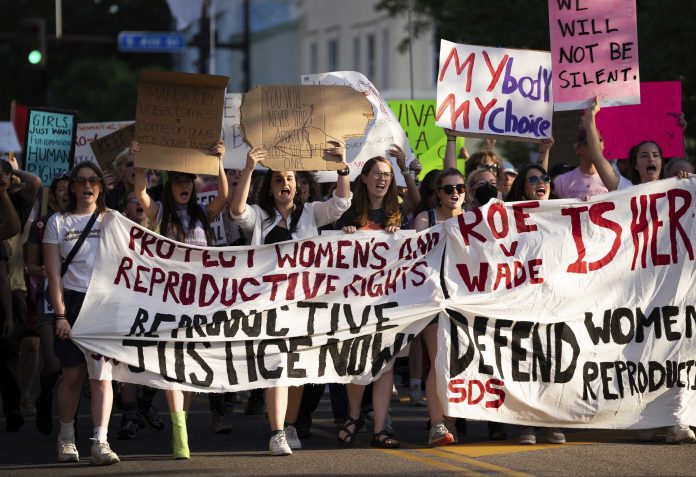
By SAM METZ, JENNIFER McDERMOTT and STEVE KARNOWSKI
Associated Press
SALT LAKE CITY (AP) — A judge in Utah was deciding Monday whether to allow a trigger-law ban on abortion to take effect while a Minnesota judge declared most of that state’s restrictions on abortion unconstitutional, as the implications of the U.S. Supreme Court overturning Roe v. Wade are being sorted out nationwide.
In Michigan, a campaign turned in a record-breaking number of signatures so voters can be asked on the November ballot whether to enshrine abortion rights in the state constitution.
Last month’s Dobbs v. Jackson ruling overturned the 1973 Roe v. Wade ruling that found that the right to abortion was protected by the U.S. Constitution. The issue reverted to the states, setting off new court battles and ballot initiatives as many states act to curtail or ban abortions.
Utah is among more than a dozen states with trigger laws designed to limit abortion upon the overturning of Roe v. Wade. The Utah law bans nearly all abortions, except for in cases of rape, incest or when maternal health is threatened. A Republican-appointed judge blocked its enforcement for 14 days after the state’s branch of Planned Parenthood sued.
Planned Parenthood argues the law violates the Utah Constitution’s equal protection and right to privacy provisions. Utah’s attorneys argue that state abortion bans pre-dating Roe span to when the state constitution was drafted and accuse Planned Parenthood of trying to “interrupt and ultimately override the Legislature’s judgment.”
The judge’s temporary restraining order expired Monday. District Court Judge Andrew Stone is now deciding whether to grant a preliminary injunction, which would let Planned Parenthood clinics continue to provide abortion care until the court rules on the constitutional questions.
Since the case began, another Utah law banning most abortions after 18 weeks took effect.
The judge in Minnesota declared most of the state’s restrictions on abortion unconstitutional, including a 24-hour waiting period and a requirement that both parents be notified before a minor can get an abortion. Ramsey County District Judge Thomas Gilligan also struck down requirements that only physicians can perform abortions and that abortions after the first trimester must be performed in hospitals. His order took effect immediately, meaning the limits can’t be enforced.
Gender Justice and other abortion rights supporters argued that the restrictions were unconstitutional under a 1995 Minnesota Supreme Court holding that the state constitution protects abortion rights. The judge called that case “significant and historic” and said it’s unaffected by the recent U.S. Supreme Court ruling.
“These abortion laws violate the right to privacy because they infringe upon the fundamental right under the Minnesota Constitution to access abortion care and do not withstand strict scrutiny,” Gilligan wrote.
Opponents of abortion rights condemned the decision. Minnesota Citizens Concerned for Life said the laws challenged in the case are “common sense measures that support and empower pregnant women” and striking them down blocks residents from “enacting reasonable protections for unborn children and their mothers.” A Republican attorney general candidate called on the Democratic attorney general to appeal.
Alongside lawsuits to challenge bans, abortion rights supporters are trying to add ballot questions to enshrine abortion rights in state constitutions.
More than 750,000 signatures were turned in by the campaign in Michigan on Monday — close to double the number needed. The Democratic governor and attorney general in the battleground state have both made abortion rights a centerpiece of their reelection campaigns.
“The number of signatures showed that here in Michigan we trust women. We trust people. We trust doctors, not politicians, to make decisions about our body, our pregnancy and parenthood,” Reproductive Freedom for All spokesperson Shanay Watson-Whittaker said during a news conference in Lansing.
The signatures still must be verified and validated. A judge has temporarily blocked a 1931 Michigan law that would make abortion a felony except when “necessary to preserve the life of such woman.”
Gov. Gretchen Whitmer has said that the law is invalid under the due process and equal protection clauses of the state constitution. The injunction, which stems from a Planned Parenthood lawsuit, could be revoked at any time.
Last week, backers of a last-minute effort to enshrine abortion rights in the Arizona Constitution failed to collect enough signatures to make the November ballot. In California, voters will decide in November whether to guarantee the right to an abortion in their constitution. Democrats who control the government in California fear the state’s abortion laws could be vulnerable to legal challenges.
















